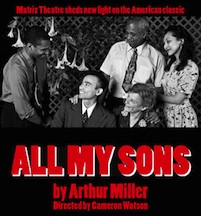AN ANACHRONISTIC LOOK AT RACE IN AMERICA
There’s no doubt that Arthur Miller’s 1947 play All My Sons is an astonishing piece of theatre. Not only is the writing brilliant, but the themes addressed are timeless and important. It’s difficult to imagine how the play could possibly be improved. Yet that is exactly what the Matrix Theatre has sought to do. Maybe they didn’t set out to improve it, but it’s difficult to imagine that they intended to change it for the worse. As the third in a series of plays exploring race in America, All My Sons has been cast multi-racially. Needless to say, Arthur Miller’s characters in All My Sons are uniformly Caucasian, so it’s a bit odd to see a Korean answering to the name Ann Deever or a Latina (Maritxell Carrero) answering to the name Lydia Lubey.
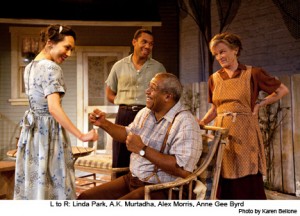 While it’s great to see a multi-racial cast on stage, which has the added effect of attracting a multi-racial audience, one can’t say that it adds anything to Arthur Miller’s play. No new nuances are revealed by casting the Kellers as a mixed race couple, or the Deevers as Asian and the Lubeys as Latino. The Matrix Theatre Company hasn’t gone so far as to change Arthur Miller’s text to emphasize these new differences of race. No character ever alludes to another character’s race. The change is purely cosmetic, altering nothing at all of the play’s substance. If one were to try to go beyond the cosmetic and read something deeper into the multi-racial casting, one is left only with anachronism. Such a mixing of races as The Matrix Theatre Company’s cast portrays would be simply unthinkable in 1947, when Arthur Miller wrote his play. Although its themes are timeless, its setting is not. All My Sons, whose focus is on a family bereft of a son, is firmly anchored in the immediate post-World War II era.
While it’s great to see a multi-racial cast on stage, which has the added effect of attracting a multi-racial audience, one can’t say that it adds anything to Arthur Miller’s play. No new nuances are revealed by casting the Kellers as a mixed race couple, or the Deevers as Asian and the Lubeys as Latino. The Matrix Theatre Company hasn’t gone so far as to change Arthur Miller’s text to emphasize these new differences of race. No character ever alludes to another character’s race. The change is purely cosmetic, altering nothing at all of the play’s substance. If one were to try to go beyond the cosmetic and read something deeper into the multi-racial casting, one is left only with anachronism. Such a mixing of races as The Matrix Theatre Company’s cast portrays would be simply unthinkable in 1947, when Arthur Miller wrote his play. Although its themes are timeless, its setting is not. All My Sons, whose focus is on a family bereft of a son, is firmly anchored in the immediate post-World War II era.
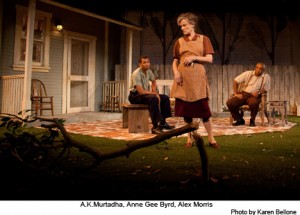 Setting aside the novel multi-racial casting of All My Sons, The Matrix Theatre Company’s production of Arthur Miller’s play is moving and powerful. It comes across less as an exploration of corporate greed and social responsibility than as an illustration of moral development. Like many young men, Chris Keller equated his ideals with the person who represented them, his father. The dramatic action of the play shows Chris’ passage into maturity, which occurs when he is able to separate the two without either abandoning his ideals or ceasing to love his father. This could also be characterized as a movement from seeing things in black and white – clear moral choices – to seeing multiple shades of grey. The ability to live with ambiguity, especially moral ambiguity, is not easy. The tragedy of All My Sons occurs when Joe Keller retreats into black and white.
Setting aside the novel multi-racial casting of All My Sons, The Matrix Theatre Company’s production of Arthur Miller’s play is moving and powerful. It comes across less as an exploration of corporate greed and social responsibility than as an illustration of moral development. Like many young men, Chris Keller equated his ideals with the person who represented them, his father. The dramatic action of the play shows Chris’ passage into maturity, which occurs when he is able to separate the two without either abandoning his ideals or ceasing to love his father. This could also be characterized as a movement from seeing things in black and white – clear moral choices – to seeing multiple shades of grey. The ability to live with ambiguity, especially moral ambiguity, is not easy. The tragedy of All My Sons occurs when Joe Keller retreats into black and white.
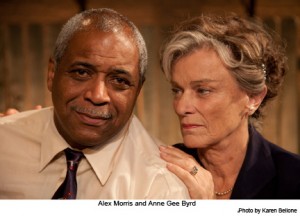 There is not a weak performance in the cast. Alex Morris plays Joe Keller with depth and complexity. He is a man both jovial and authoritative, traits which are naturally underscored by his large frame. Anne Gee Byrd, playing his wife, is fantastic as always, though she appears somewhat small and slight next to Morris. The real standout performances, however, are those of A. K. Murtadha as Chris Keller and Linda Park as Ann Deever. These two are absolutely compelling as a couple in love, even though they’re being pulled in opposite directions by family members who disapprove of their union. And Murtadha perfectly conveys the internal struggle going on within him, the struggle to break free from parental authority and assert his own independence. It is amazing that Arthur Miller managed to pack so much drama into a play that takes place in the space of one day.
There is not a weak performance in the cast. Alex Morris plays Joe Keller with depth and complexity. He is a man both jovial and authoritative, traits which are naturally underscored by his large frame. Anne Gee Byrd, playing his wife, is fantastic as always, though she appears somewhat small and slight next to Morris. The real standout performances, however, are those of A. K. Murtadha as Chris Keller and Linda Park as Ann Deever. These two are absolutely compelling as a couple in love, even though they’re being pulled in opposite directions by family members who disapprove of their union. And Murtadha perfectly conveys the internal struggle going on within him, the struggle to break free from parental authority and assert his own independence. It is amazing that Arthur Miller managed to pack so much drama into a play that takes place in the space of one day.
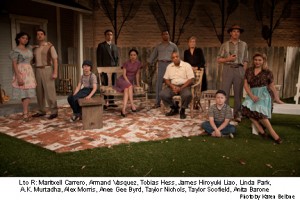 As mentioned before, All My Sons is firmly anchored in the post-war era, and this is reflected in the costumes and set design. Linda Park always catches the eye in her stylish, well-tailored dresses. It is no wonder that the Kellers’ jealous neighbor, Sue Bayliss (Anita Barone), tries to run Ann Deever out of town, lest Ann attract the wandering eyes of Sue’s husband, Dr Bayliss (Taylor Nichols). The latter appears as more of a playboy than a doctor, always running around in an open-necked shirt rather than a suit, perhaps with bow tie, as one might expect.
As mentioned before, All My Sons is firmly anchored in the post-war era, and this is reflected in the costumes and set design. Linda Park always catches the eye in her stylish, well-tailored dresses. It is no wonder that the Kellers’ jealous neighbor, Sue Bayliss (Anita Barone), tries to run Ann Deever out of town, lest Ann attract the wandering eyes of Sue’s husband, Dr Bayliss (Taylor Nichols). The latter appears as more of a playboy than a doctor, always running around in an open-necked shirt rather than a suit, perhaps with bow tie, as one might expect.
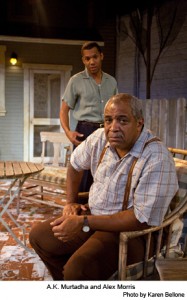 Despite a multi-racial cast that, if read literally, transforms Arthur Miller’s play into an anachronistic parody, The Matrix Theatre Company’s new production of All My Sons, although powerful, thought-provoking, and moving, still fails in its stated intention of examining race in America. Like so much of our nation’s present approach to race, gender, culture, and sexual orientation, that aspect of this production is well-intentioned but sadly misguided.
Despite a multi-racial cast that, if read literally, transforms Arthur Miller’s play into an anachronistic parody, The Matrix Theatre Company’s new production of All My Sons, although powerful, thought-provoking, and moving, still fails in its stated intention of examining race in America. Like so much of our nation’s present approach to race, gender, culture, and sexual orientation, that aspect of this production is well-intentioned but sadly misguided.
photos by Karen Bellone
All My Sons
Matrix Theatre, Los Angeles
scheduled to end on December 18
for tickets, visit http://www.matrixtheatre.com
